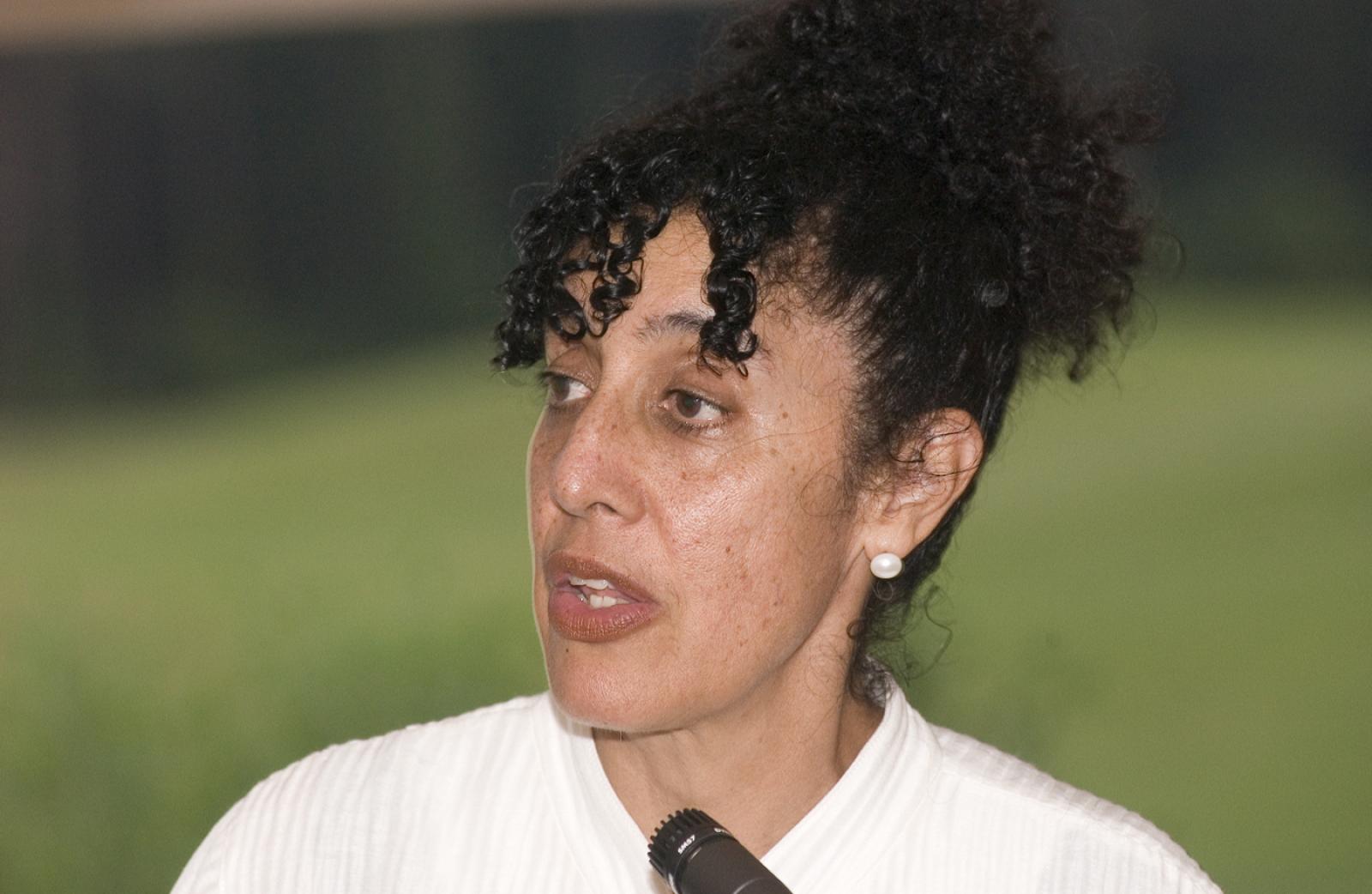As canaries once signalled early warning for coal miners, so kids in today’s Harlem serve as a warning to Americans to change the way we deal with poor young minorities, according to Harvard Law Prof. Lani Guinier.
She sounded an alarm over the steep challenges facing black and Hispanic youth in Harlem, when she was guest speaker Monday at a benefit at Farm Neck Golf Club for the nonprofit organization Brotherhood/Sister Sol.
In a passionate speech driven by anger and sorrow but marked with hope, Ms. Guinier used the controversial arrest of fellow Harvard Prof. Henry Louis (“Skip”) Gates Jr. as an example of the stark racial inequality that still exists in this country.
“This is a story, really, about how America has failed all of its citizens,” said Ms. Guinier, coauthor of The Miner’s Canary, a book that proposes a shift in the way we deal with issues of race in this country. She said the circumstances surrounding the Gates incident are closely linked to the adversity facing underprivileged youth in Harlem.
“The only instrument of urban social policy that this country has pursued with vigor in the last 40 years is mass incarceration,” she said. “The school to prison pipeline is not an accident.”
She cited poverty as a key factor in the dual — lack of education and criminal activity — that plague minorities, particularly black Americans. “The association [between] blacks and poverty stigmatizes all blacks,” including the middle and upper classes, she said.
“When you think about where the wealth is in this country, it is from inter-generational wealth transfer,” she said. But in a country where black Americans were introduced as slaves and barred from owning property, it was nearly impossible to develop a foundation upon which to accumulate wealth. And she said the denial of property ownership is an important part of the legacy of black Americans.
Today, almost 30 per cent of the black population has zero or negative net worth, she said, and the median net household worth for black families in the United States is $6,000, compared to $90,000 for white families.
“Slavery was written into the DNA of this country,” she said. “It affects all of us, not just the people who were slaves.”
The effects are evident in the Harlem youth, many of whom will follow the school to prison pipeline almost automatically without positive interception. But the challenges are not insurmountable. Ms. Guinier believes that the accomplishments of Brotherhood/Sister Sol are potentially far reaching.
“What the Brotherhood/Sister Sol is doing is not just rescuing black kids who live in Harlem. It is helping to rescue the soul of the United States, because we have failed to come to terms with the legacy of slavery and its aftermath. They are rescuing the future from the past. They are investing in our collective future,” she said.
Brotherhood/Sister Sol was cofounded in 1995 by Khary Lazarre-White and Jason Warwin. As undergraduates at Brown University, the childhood friends began to work with troubled teenage boys on the south side of Providence. “They were very deep into a lot of criminal activity,” recalled Mr. Lazarre-White. “They started getting involved with gang activity [and] drugs.”
A local community center had all but given up hope in helping the teens when they appealed to Mr. Lazarre-White and Mr. Warwin for assistance. “We thought we could do it,” said Mr. Lazarre-White. “We started working with them and in a year we were able to help all of them get out of that lifestyle and get back to their life path.”
After graduation, the two men returned to New York city, where they had grown up, and decided to take an entrepreneurial approach to social activism. “We didn’t want to work for somebody else, we wanted to do our own thing,” said Mr. Lazarre-White. “So we created the Brotherhood.”
For the first three years they worked exclusively with young men, but they quickly decided that the mission should extend to young women as well. After three years, they expanded into Brotherhood/Sister Sol, which provides support and guidance to youths between the ages of six and 21 through education, cultural and family challenges.
In 14 years, they have seen astonishing success rates. Ninety-five per cent of Brotherhood/Sister Sol alumni are either enrolled in college or working at a full-time job. And the percentage of alumni who are currently incarcerated is zero. These statistics diverge sharply from national averages.
“We really are trying to help young people . . . realize their individual potential,” said Susan Wilcox, former co-executive director who now handles program and professional development for the organization. “We do that through a . . . comprehensive process, so that there is a very intensive involvement in the life of young people.”
The successful program is spreading nationwide. Board members travel throughout the country to train people in applying the outreach model. They have also published books on the subject. “We’re local, and yet we have a much wider reach,” said Mr. Lazarre-White.
Brotherhood/Sister Sol treasurer Stephen Graham is a Vineyard homeowner and a member of Farm Neck Golf Club. “I had seen other benefits here, and I thought it would be such a great place for Brotherhood/Sister Sol to . . . have a benefit,” he said at on Monday. Mr. Graham was thrilled that Ms. Guinier agreed to speak. “She has a philosophical connection [to the organization] and is very sympathetic to what we’re doing,” he said.
“We feel very lucky to have her,” agreed Ms. Wilcox. “As a black woman she has had to strive in ways that other people have not. She’s certainly somebody that truly embodies the values that we are about.”




Comments
Comment policy »